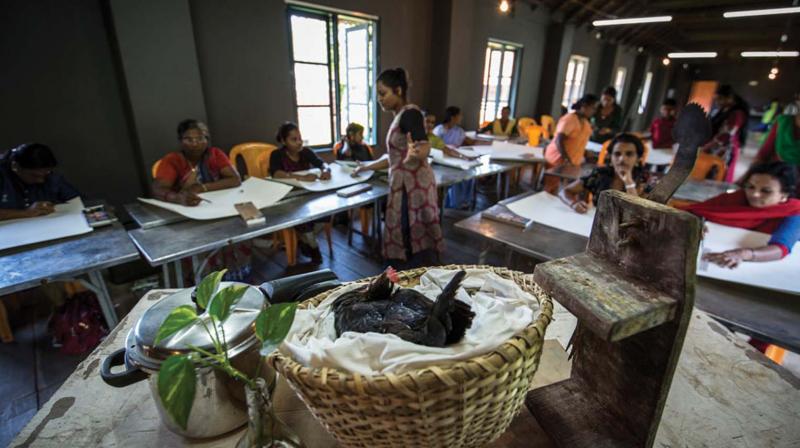Food not just for thought
Kochi-Muziris Biennale will be serving art on a plate literally.

From providing food for thought through a range of socially-engaged artworks, the Kochi-Muziris Biennale, this time, will serve art on a plate - literally. The fourth edition of the Biennale, starting next week, features an off-beat project called ‘Edible Archives’, where visitors can try a variety of dishes being prepared on the spot.
Curator of this year’s Biennale, Anita Dube says the three food projects at Fort Kochi keep with the event’s core theme: Possibilities of a Non-Alienated Life. “If you are tired and hungry, how will you have the energy to look at the beautiful works on display?” she says. “My exploration has been about ways in which we can engage with each other. Food, too, is integral to coming together.”
So, come December 12, and Cabral Yard will feature two food projects, while the pivotal Aspinwall House, too, will have one based on food. The one at Cabral Yard is a community cafe by the Kerala government’s women-empowering Kudumbasree volunteers. The second, a Biennale infra-project called ‘Edible Archives’, will highlight the diversity of heirloom varieties of paddy, as caterer-author Prima Kurien and chef Anumitra Ghosh Dastidar will facilitate cooks to experiment with indigenous rice. Across the road, at Aspinwall, artist Vipin Dhanurdharan will ready traditional dishes from communities of Fort Kochi-Mattancherry in an open kitchen that promotes community dining.
The Kochi Biennale Foundation, which has been organising the once-in-two-years Biennale since 2012, notes that cuisine, like art, has the ability to communicate the values and culture of a people. “For me, everything is art. Good food, like good art, is the essence of its environment,” says Foundation president Bose Krishnamachari. “Food can create memories and evoke distinct feelings. It is a more intimate art, as it incorporates all the senses.”
The Kudumbasree Mission will have 20 units serving culinary delicacies from various districts of Kerala at a nominal price. “We will also be selling handicrafts made by our workers,” reveals Soya Thomas, State Programme Manager of Kudumbasree. The 90-day section will also host a seminar on women empowerment. The unit will run videos on 20-year-old Kudumbasree.
‘Edible Archives’ provides a platform for bringing traditional cooking methods into the contemporary, where the chefs can showcase their skills rooted in their own journeys and culinary traditions. “Every time we eat something, it becomes a part of our personal archive,” notes Anumitra. Adds Prima: “Food is something that is constantly being created and recreated. And then it vanishes, too.” Their project, anchored by four women chefs, will have a ‘Rice Stories’ stall that showcases 16 varieties of rice that are not commercially viable — such as kagisale from Karnataka, kalonuniya from Bengal and thavalakkannan from Kerala.
As for Vipin’s work at Aspinwall, it is based on anti-caste teachings of 20th-century Kerala social reformer Sahodaran Ayyappan. “He (1889-1968) conducted ‘mishra bhojanam’, where people of all castes would eat together - a revolutionary event those days,” notes the 30-year-old artist, explaining his work titled ‘Sahodaran’ (referring to brotherhood) featuring an open kitchen and a table to share the meal.
Dube explains that Vipin’s idea of community dining fits well into her curatorial theme of collaboration and questioning alienation. “On the other hand, ‘Edible Archives’ is an infra project that focuses on clean flavours and fresh ingredients, combined with rigorous culinary techniques. Kudumbasree, too, aims for women’s empowerment, which is a focal aspect of this Biennale,” notes the Lucknow-born curator, an alumnus of Maharaja Sayajirao University in Baroda, Gujarat.
Overall, Dube says she wants Biennale visitors to be active spectators. “The Biennale, as I see it, will be a celebration of coming together and learning.”

